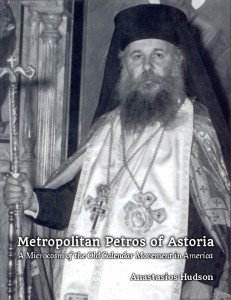American Independence and Our Freedom in Christ
Dear Friends in Christ,
On Sunday, we celebrated American Independence Day, our nation’s birthday, a day when we thank God for the freedom we have in this country to live where we wish, work in the profession we choose, and worship God as we choose to. In centuries past, and even today, many people have not enjoyed these same freedoms, and live under oppressive governments. In fact, our own Church, the Old Calendar Greek Orthodox Church, was even banned in Greece after the majority of the clergy accepted the forced change of calendars in 1924, and this situation continued technically through the 1970s, although persecutions were the worst in the 1950s. In fact, our first bishop in America, Metropolitan Petros, came from Greece after his family property was seized by the state! We have a lot to be thankful for, indeed.
How we choose to exercise our freedom, though, is the next question. In order to embark on the journey to freedom, our ancestors had to choose to give up certain things, in the hope of gaining other things. There was a price tag, and there were certainly trade-offs. Some knew they would never enjoy the fruit of their own labor, but believed they could provide a better life for their children. Such acts revealed a true self-sacrificial spirit, which laid a great foundation for us.
Sometimes, our ancestors made mistakes; slavery was permitted in some states, and women were denied the right to vote. On an individual level, some attempted to start businesses which failed, and others chose the wrong person to settle down with. Yet it would be hard to imagine even among those whose plans did not turn out the way they had hoped, that they would have chosen any other path than that of pursuing the freedom to at least make a good attempt.
Our religious freedom is one of the things that the Founding Fathers struggled for. In a cultural sense, this country was founded on Christian ideals. However, not all of the Founding Fathers were actually Christians—many belonged to a religious philosophy called Deism, which believed that a Creator fashioned the universe, but left it then to its own devices. In their view, God was a master architect or craftsman, or perhaps the embodiment of the laws of nature. They did not accept that this same God became man as Jesus Christ, to actually die on the Cross for our sins, and enable man to partake of eternal life with God. However, Deists and Christians alike shared a common culture, which we refer to as a Christian culture, and they agreed to allow differences in denominations and beliefs in order to avoid the wars of religion which had plagued Europe in the 16th and 17th centuries.
Such tolerance and allowance for free choice in the pursuit of religion did not necessarily imply relativism, however. While allowing for others to have a right to believe as they wish, many nevertheless attempted to sway others to their position. Proselytism has gained a negative connotation in our modern, relativistic world, but many of us understand intrinsically that there are right and wrong views, just as there are right and wrong actions. For instance, Jesus Christ is either the Lord and Savior of the world, or He is not. If we have learned that a view can be demonstrated to be false, then we owe it to others to share that information (although the manner in which we share our beliefs with others is key to how it is received).
Beyond simply believing this, we also must make the choice in our own lives whether to follow Him. Here is where freedom really is felt; because we are free to worship as we wish, we are held to a higher standard of accountability. We have luxury time—even the most busy of us still has much more time than people who lived several hundred years ago—and the resources to research the claims made. Those of us who are new to parenting spend countless hours researching the most healthy food for our babies; when it’s time for a new car, we compare and contrast diligently. Yet how many of us spend the same amount of time assessing our spiritual life, both in terms of where we choose to worship (or not worship), and how we choose to live?
If we really confess that we believe in God, we owe it to ourselves to make sure we are on the right track. Freedom is more than a feeling or a preference; freedom is the ability to do the right thing. The choice is ours, but if we decide to follow the right path, the rewards are great, and as our Founding Fathers embarked to a new land in order to have a new life, we can embark to a new spiritual land, where our lives will be transformed, as will the lives of our families.
In Christ,
Fr. Anastasios


